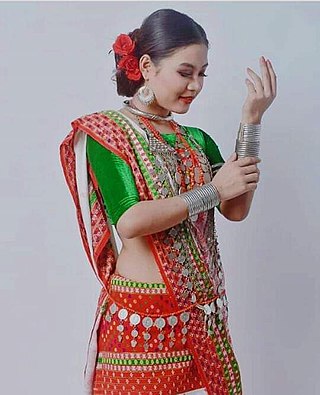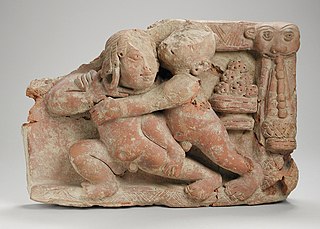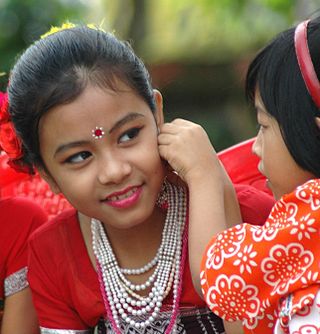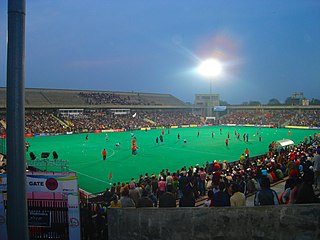Related Research Articles

Tag is a playground game involving one or more players chasing other players in an attempt to "tag" and mark them out of play, usually by touching with a hand. There are many variations; most forms have no teams, scores, or equipment. Usually, when a person is tagged, the tagger says, "Tag, you're 'It'!". The last one tagged during tag is "It" for the next round. The game is known by other names in various parts of the world, including "running and catching" in India and "catch and cook" in the Middle East.

Arm wrestling is a sport with two opponents who face each other with their bent elbows placed on a table and hands firmly gripped, who then attempt to force the opponent's hand down to the table top. The sport is often casually used to demonstrate the stronger person between two or more people.

The Tripuri, are a Tibeto-Burman-speaking ethnic group of Northeast Indian state of Tripura. They are the descendants of the inhabitants of the Twipra/Tripura Kingdom in North-East India and Bangladesh. The Tripuri people through the Manikya dynasty ruled the Kingdom of Tripura for ~450 years until the kingdom joined the Indian Union on 15 October 1949.

Malla-yuddha is the traditional form of combat-wrestling originating in the Indian subcontinent. It is closely related to Southeast Asian wrestling styles such as naban and is one of the two ancestors of kushti. Indian wrestling is described in the 13th century Malla Purana.
The Dances of Tripura refer to several forms of folk dance performed in the state of Tripura in northeastern India. These dances are performed by the Tripuri and Mog peoples, during annual regional celebrations, such as sowing and harvesting festivals.
Reang is a Bru clan of the Northeast Indian state. The Reangs can be found all over the Tripura state in India. However, they may also be found in Assam and Mizoram. They speak the Kaubru language.

The Tripuri culture of North-East India has many distinctive features.

Real World/Road Rules Challenge: The Gauntlet 2 is the 11th season of the MTV reality game show, The Challenge. The season is directly subsequent to The Inferno II.
Traditional Filipino games or indigenous games in the Philippines are games that have been played across multiple generations, usually using native materials or instruments. In the Philippines, due to limited resources for toys, children usually invent games without needing anything but players.There are different kinds of Philippine Traditional Games that are suited for kids, and the games also stand as one of the different culture and/or traditional games of the Philippines. These games are not only fun to play, but these games are also good for you. This is because different games require different skills. These games are also an important part in Filipino culture.

Mallakhamba, or mallakhamb is a traditional sport, originating from the Indian subcontinent, in which a group of gymnasts perform aerial yoga and gymnastic postures using wrestling grips in concert with a stationary vertical pole. The word "mallakhamb" also refers to the pole used in the sport. The pole is usually made from sheesham polished with castor oil. Other popular versions of mallakhamba are practiced using a cane or a rope instead of a pole. The origins of pole dancing can be traced back to the sport of mallakhamba.

Hojo undō (補助運動) is a Japanese language term, translated as "supplementary exercises", that refers to conditioning exercises used in martial arts, especially in karate. Hojo undō training was designed to develop ambidextrous physical strength, stamina, muscle coordination, speed, and posture. This style of training uses simple, traditional devices made from wood and stone.

The culture of Tripura is distinct and a bit similar to other people of Northeast India. However like Assam, Manipur, Burma and Southeast Asia culture of Tripura is characterized in small portion where people live in plain and hill areas. Tripura is a state in North East India. In the 2001 census of India, Bengalis represented almost 70% of the population and the Tripuri population comprised 30% of Tripura's population. The Tripuri population comprises some clans and ethnic groups with diverse languages and cultures. The largest native group was the Tripuri who had a population of 543,848 in 2001 census, representing 16.99% of the state population and 54.7% of the scheduled tribe population. The other group of people in order of decreasing population were Chakma (6.5%), Halam (4.8%), Mog (3.1%), Munda, Kuki tribes and Garo Hajong. Bengali is the most spoken language, due to the dominance of Bengali people in the state. Kokborok (Tripuri/Tiprakok) is a common language among Tripuris and lingua franca in Tripura. Several other languages belonging to Indo-European and Sino-Tibetan families are spoken by the different tribe

Real World Road Rules Challenge: The Ruins is the 18th season of the MTV reality television game show, The Challenge. This is the last season to use Real World/Road Rules in the on-screen title, before being shortened to The Challenge in the 19th season.

Korea has traditional sports of its own, as well as sports from different cultures and countries.

Punjabis play a wide variety of sports and games, ranging from modern games such as hockey and cricket, to the more traditional games such as Kabaddi, Kushtian (wrestling) and Khuddo khoondi. There are over 100 traditional games and sports of Punjab.

Barróg was a style of folk wrestling practiced in Ireland until the early 20th century. It was a type of backhold wrestling, similar to Scottish Backhold and Cumberland and Westmorland wrestling.

Physical training has been present in human societies throughout history. Usually, it was performed for the purposes of preparing for physical competition or display, improving physical, emotional and mental health, and looking attractive. It took a variety of different forms but quick dynamic exercises were favoured over slow or more static ones. For example, running, jumping, wrestling, gymnastics and throwing heavy stones are mentioned frequently in historical sources and emphasised as being highly effective training methods. Notably, they are also forms of exercise which are readily achievable for most people to some extent or another.

India has several traditional games and sports, some of which have been played for thousands of years. Their popularity has greatly declined in the modern era, with Western sports having overtaken them during the British Raj, and the Indian government now making some efforts to revive them. Many of these games do not require much equipment or playing space. Some of them are only played in certain regions of India, or may be known by different names and played under different rules and regulations in different regions of the country. Many Indian games are also similar to other traditional South Asian games.
References
- ↑ "Tripura Sports, Traditional Games of Tripura, Wrestling in Tripura". www.tripuraonline.in. Retrieved 12 February 2024.
- ↑ Das, S. C. (1 June 2021). "STUDY ON THE SELECTED INDIGENOUS SPORTS OF TRIPURA: A THEMATIC APPROACH" (PDF). Vidyabharati International Interdisciplinary Research Journal 12(2). 12/2 (12/2): 463–474 – via viirj.org.
- ↑ "Tripura, the land of fourteen gods and million statues". www.tripura.org.in. Retrieved 12 February 2024.
- ↑ Debbarma, Khumtia (16 October 2020). "Here's How Tripura's Tribal Communities Play Tengdang, A Popular Traditional Game". Adivasi Lives Matter. Retrieved 12 February 2024.